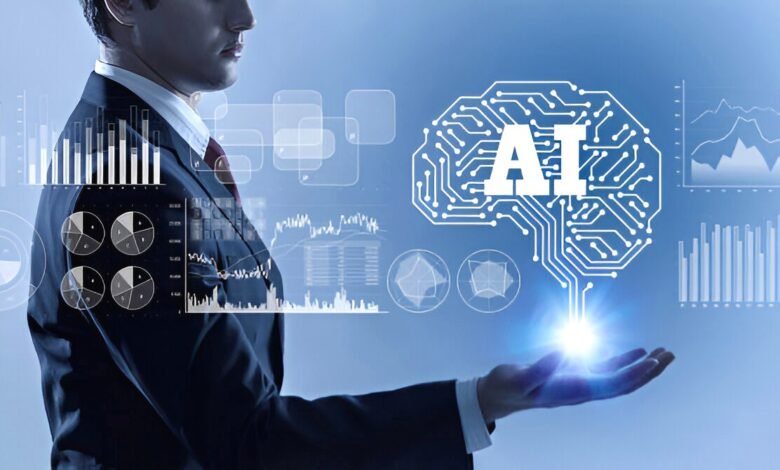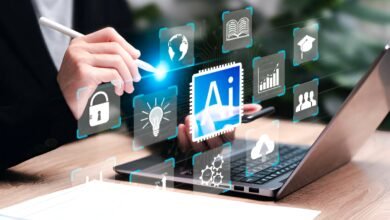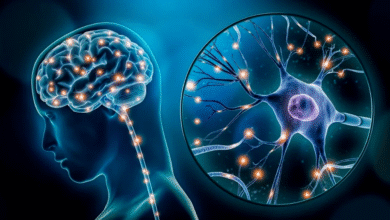AI Predictions for 2025: What to Expect

We have witnessed innovation and some worldwide business changes along the artificial intelligence (AI) journey of 2023.
With a 40% rise in worldwide investment, McKinsey appropriately termed 2016 “AI’s breakout year.”
How will the rapid use of AI affect 2025 as we traverse this period of ongoing innovation and corporate growth?
This article delves into our AI predictions, examining the top seven trends shaping the field in the coming year.
Related: Tech Trends to Watch: Predictions for the Coming Years
6 Upcoming AI Predictions For 2025
1. Scientific Researches
The advances in 2023 demonstrate how significantly AI can change how science is discovered.
Artificial intelligence (AI) has a profound effect on many scientific fields, whether it is transforming biology by accurately predicting protein sequences and functions or accomplishing hitherto unthinkable jobs like predicting earthquakes with an astounding 70% accuracy rate.
The discovery of INS018_055 and abaucin serves as an example of how AI is transforming drug discovery.
AI has improved supernova detection in astronomy, showing its capacity to solve cosmic riddles.
In addition, AI’s practical uses are demonstrated by its ability to forecast weather, which outperforms conventional approaches up to several days in advance.
Scientists are encouraged to pursue new directions and test the limits of what artificial intelligence (AI) can do for scientific research as 2025 nears.
2. Ethical AI
We believe that in 2025, ethical issues will become increasingly important as AI becomes more extensively used in our daily lives. The need for ethical approaches and behaviours is becoming more apparent, from the fight against false information to addressing biases and guaranteeing openness.
The likelihood is that unethical behaviour will eventually be connected to artificial intelligence (AI) and bring this to the public’s attention, whether that is next year or another year.
In any case, the broad use of AI in many industries highlights the necessity of constant watchfulness and a resolute dedication to tackling new ethical issues.
3. Sustainable AI
In the coming year, a major shift towards sustainable AI is expected to become a major trend.
Larger model development has been the main focus of traditional AI research, which has produced amazing breakthroughs but also raised questions about resource and energy use.
This creates problems for accessibility and sustainability, especially in settings with limited resources.
In response to these difficulties, a new trend that emphasises the development of smaller, more energy-efficient models is beginning to emerge. Notable advancements in this regard include Microsoft’s Orca and Low-Rank Adaptation (LoRA).
The movement towards sustainable AI is expected to gain traction as 2025 draws near. The deliberate focus on building small but effective models has the potential to democratise the benefits of state-of-the-art AI, particularly for resource-constrained small organisations and environments.
4. Progress Towards Artificial General Intelligence (AGI)
As 2025 approaches, the pursuit of artificial general intelligence (AGI) continues to be at the forefront, to advance AI to a degree of adaptability that is on par with human capabilities in a variety of jobs.
Maintaining the momentum from the previous year’s explosion of multimodal AI models, we expect to significantly accelerate recent developments and enable AI to traverse and interpret a wide variety of data.
The key to attaining AGI is learning a variety of activities quickly and taking cues from the most basic instances. This method is guided by the prompt-based learning paradigm, which is especially clear in language models.
In the upcoming year, these developments should increase AI’s adaptability across a wide range of knowledge domains.
In addition, AI-powered code development and enhancement will represent a major advancement by 2025.
This feature could initiate a self-improvement process similar to the little improvements observed in models such as GPT or the Llama series.
This self-sufficient coding ability could help us achieve genuinely intelligent artificial intelligence.
Related: AI Ethics: Navigating the Moral Landscape of AI
5. AI Regulation
The necessity for AI regulation has become essential due to the exponential expansion of generative AI and worries about its possible misuse, including the creation of harmful content, deepfake content, privacy violations, and automated cyberattacks. 2025 is going to be the year of AI regulation, if 2024 was the year of generative AI.
The implementation of the EU AI Act in 2023, a ground-breaking proposal by the European Union to develop comprehensive legislation governing artificial intelligence, marks a noteworthy advancement in this regard.
While the United States and many other nations have not yet created such restrictions, everyone agrees that precise legislation governing AI is absolutely necessary. It is anticipated that as 2025 come closer, more nations will actively participate in the regulatory process, increasing the momentum for the creation of these regulations.
Businesses will probably cooperate to get a consensus on these regulations. Finding a healthy balance between allowing AI to be innovative and assuring its responsible and ethical use is the fundamental objective.
6. AI in Cybersecurity
AI’s place in cybersecurity is expected to grow, given that cyberattacks are expected to have a $10.5 trillion financial impact by the end of 2025. Due to the quick growth of AI technology, the area is seeing changes in both offensive and defensive techniques.
Phishing attacks and social engineering assaults are among the new difficulties that generative AI brings with it in this rapidly changing environment. Professionals in cybersecurity now have more opportunities to improve their threat intelligence and response skills.
The combination of AI-powered real-time anomaly detection, intelligent authentication, and automated incident response becomes essential for bolstering our defences against increasingly complex attacks.
These cutting-edge elements not only make cybersecurity defences more flexible and responsive but also highlight how important artificial intelligence is to recognising and countering changing cyber threats.
The nexus between AI and cybersecurity becomes increasingly prominent as we work through our AI forecasts, presenting both new potential and difficulties for strengthening our digital security posture.
The Bottom Line
These are our AI predictions. Do you agree or disagree?
2025 looks to be a pivotal year in the development of artificial intelligence, that much is certain.
The AI landscape is expected to experience previously unheard-of growth and innovation, from the ongoing development of generative AI to breakthroughs in AGI, cybersecurity, legislation, sustainability, ethics, and scientific discoveries.
The revolutionary potential of AI allows us to envision a future in which the limits of what is possible keep growing as we set out on this adventure.







